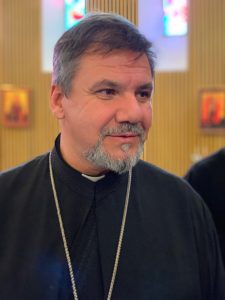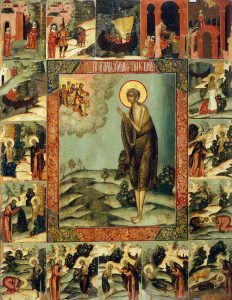What good could come out of the coronavirus pandemic? Why, for one, as we gradually close down our regular activities we are given a rare opportunity to slow down in a contemplative manner. Just remember the hectic lives we had before all this, how busy we thought we were, or we actually were, and how much that prevented us from looking beyond the surface of the mirror… We never looked inside, we looked at our image. We kept running away from ourselves, hating every second of peace and quiet, seeking the noise that made us feel alive. Well, someone got upset, packed up her toys and left us as we already were, empty shells. Now it’s up to us to regroup, to find the way in, and discover our true selves.
Now, wait a minute. Don’t you, believers, think that you fare better than your secular neighbours. You, too, are addicted to noise. Just listen to the wails we hear from all around us, people screaming that they want their church open, their liturgy back, the incense, and the hymns, and the feel of it — how much they miss it, the crowds, the boring sermons etc. That sounds like addiction to me. Though different, it’s still noise.
I don’t have much to say to our secular neighbours. I see how they get busy even staying indoors, pathetically adjusting their previous lifestyle to the infinitesimal level of their household. Well, I do, but I’m afraid they will misinterpret me. What I wish to convey is this: “come and see! Taste and see!” But my shout does not aim at having them join the equally pathetic display of our liturgical religion. I don’t want them to confuse Christianity for another form of noise-addiction. I want them to “come and see” what Christ offers to all, rebirth, renewal, the fullness of life, participation in the divine life. I want them to change their mind according to the Gospel, not to become religious people or spiritual people. I want them to understand that the Gospel teaches us how to become what we believe we are, human beings.
This also is what I have to say to my fellow believers. In times such as this, when we are out of our comfort zone, that is, prevented from gathering in the divine liturgy, we must turn towards ourselves, pray, and reflect. What are we, Orthodox Christians? What is Orthodox Christianity about? Is it a liturgical religion or is it a community of renewed people? Is our Christianity only about the liturgical setting, with its rituals and trinkets, with its noise and incense? What does the liturgical framework mean when the community gathered there is not established on the bedrock of Christ’s newness of life? What does it mean when its participants aren’t pursuing Saint Mary of Egypt’s course of life, when they avoid conversion? Yesterday, 1 April, we remembered her. Some of us might have even read her Life, by Saint Sophrony of Jerusalem. She was no churchgoer. She knew no hymns. She changed her life, however, becoming a human being, as the Gospel promises. The true answer to my questions rests therefore with her.
Scenes from the life of Saint Mary of Egypt
This might be a challenging time, this is a time of pain and suffering, of death and loss, but I believe that something good could still come out of it. We just need to turn the tables on the pandemic and learn from the limitations inflicted upon us what we truly are, what we must be, what truly matters. This also is the challenge of my new little book, The Orthodox Spring. You could begin to turn the tables on the coronavirus by starting to read it 🙂
Keep praying. Look into your hearts. Be still, listen.
For a related blog post, check this out.
2 April 2020 © AIOCS


